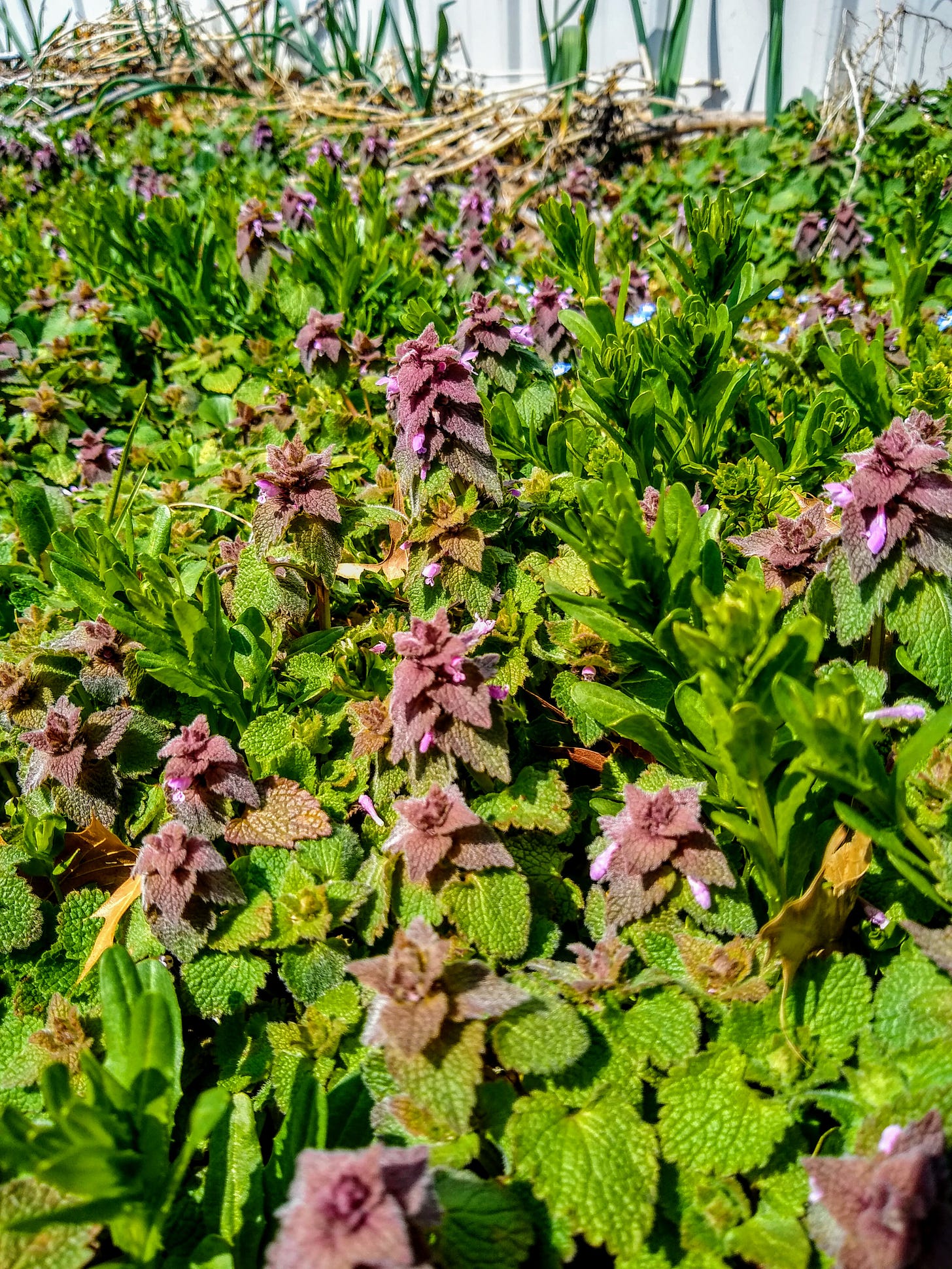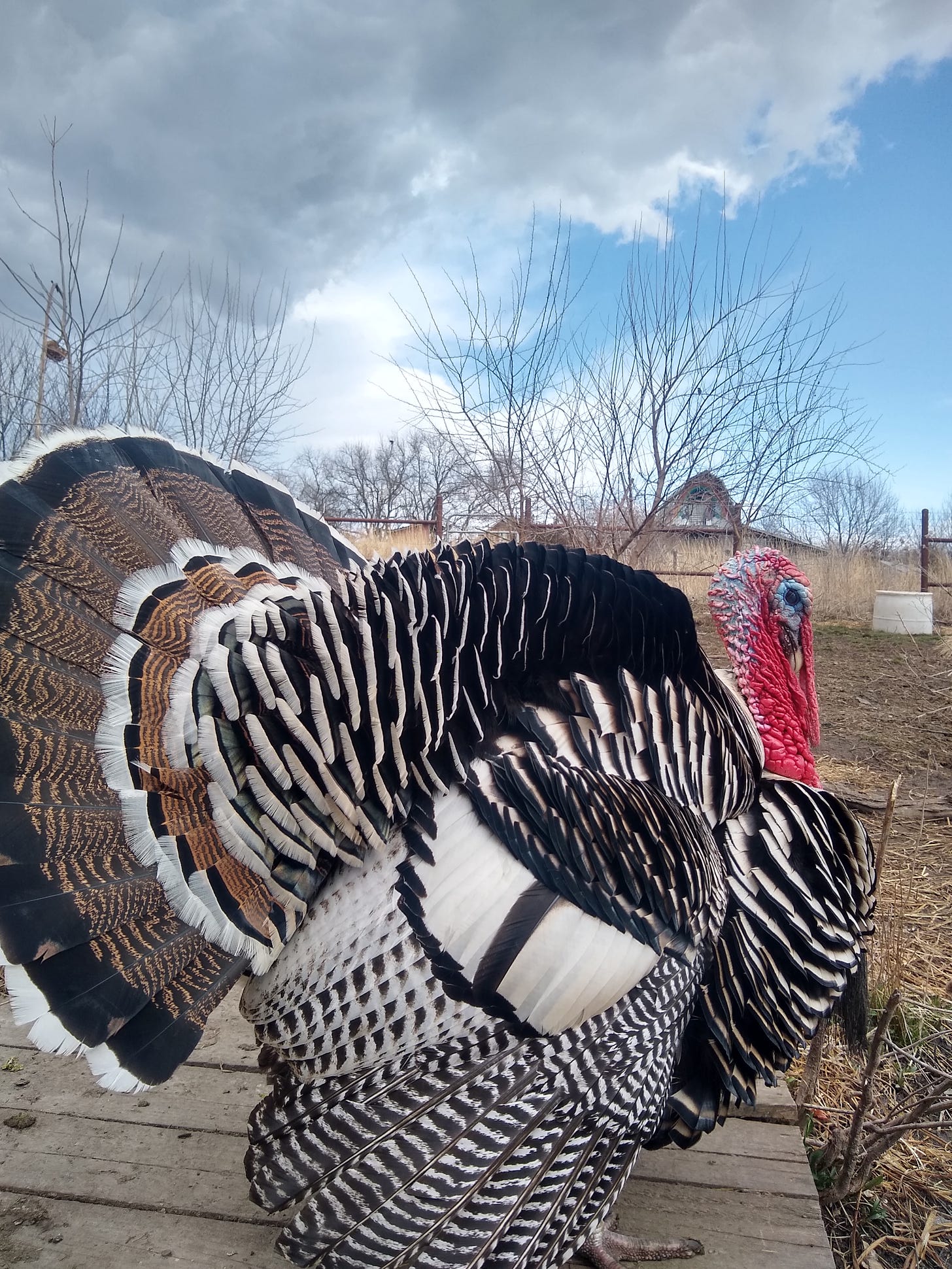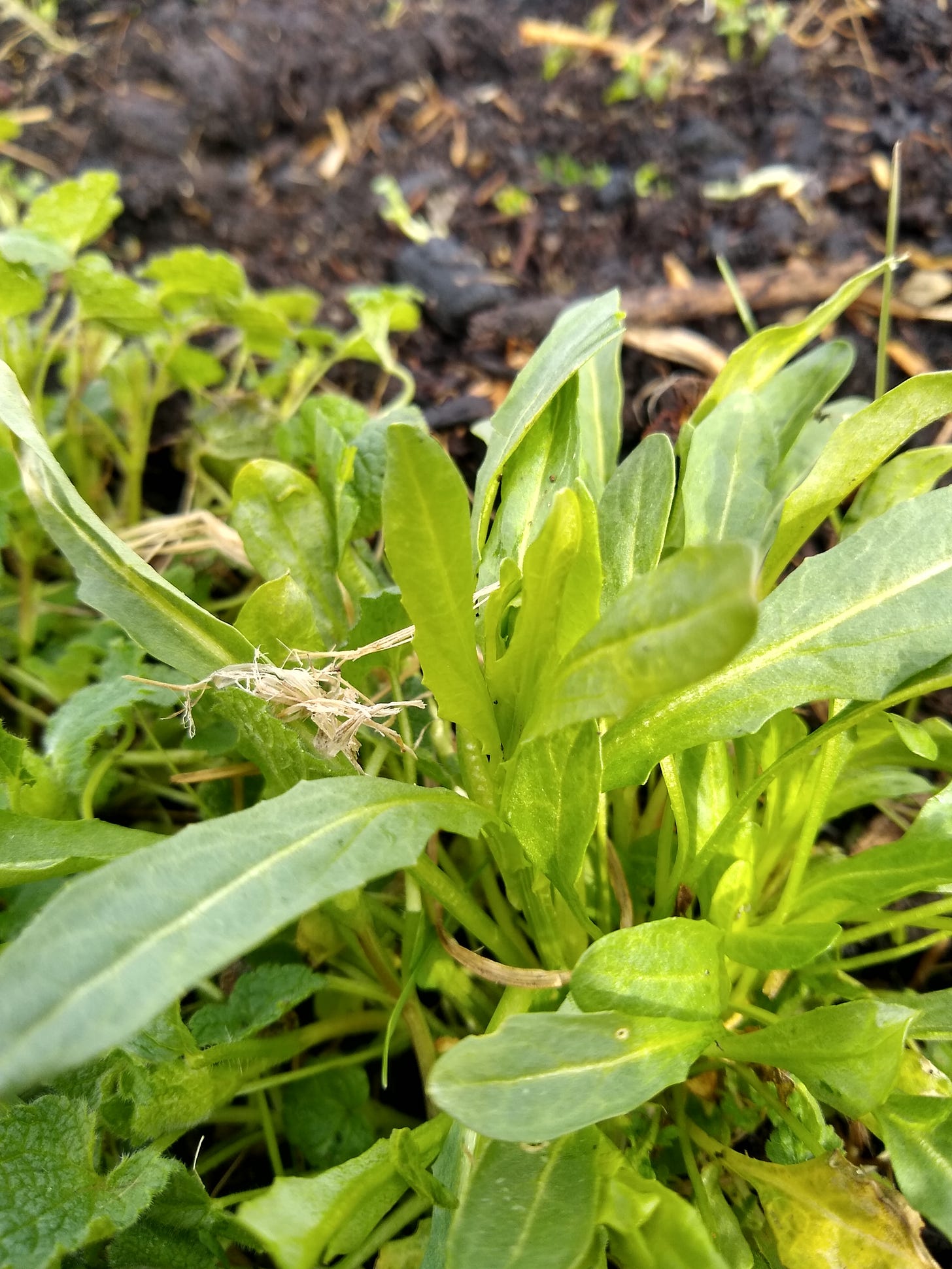Hoping in One Hand...
Early spring serves as a call to action and responsibility on the farmstead. A time to renew our commitment to humane and careful stewardship.
Peppergrass, henbit, and garlic waking up.
I have been eating lots of peppergrass, and a few days ago, when I began thinking forward to what this week's publication would be all about, I figured a discussion of peppergrass, expanding at most to all the spring tonics, would be sufficient. But, alas, there are other a few more important topics to work out, so I'll pause on peppergrass for the moment, and we'll see if I can bring it back home by the end of this missive.
The most pressing matter on my mind currently is incoming severe weather.
I like to think of myself as a nice Midwestern boy with a healthy appreciation for weather patterns. I lived out west for a spell in my early twenties. Do not recommend. There are fault lines threatening to tremble at any given moment and volcanoes ready to blow when you least expect it. Earthquakes can be engineered against, to a degree, but I don't know of any way to design your way out of lava. Also, don't forget the severe drought, atmospheric rivers, grizzly bears, tsunamis, cowboys, and that unique, fatalistic, coastal mindset that results in a simultaneously egotistic and egoless non-chalance that manifests as eating a $12 dollar CBD infused quinoa energy ball during a break from your Hot Yoga / rectal tanning session on the precipice of a continental fracture surrounded my throbbing magma and high property taxes. Nuh-uh. Give me funnel clouds, maybe a derecho, some falling down barns, whitetail deer, and politeness over all that. If your terrain is so slopey that you need to set the E-brake while parking, then your geography is too dynamic for human habitation.
I can understand a storm, largely because of the National Weather Service. Here, a potentially significant weather event can be predicted within a thick enough margin of time that I can trot about battening down barns, securing potential aerial guillotines (I maintain a curated collection of scrap roof metal) with ropes, bricks, stakes and logs. I have an earthbag root cellar and a fine quality crank emergency radio. Much of our infrastructure is tucked down in the crease of our rolling slope, just not my house, and the dairy barn, which could benefit from shelterbelt plantings. I guess I'm suggesting that here in the Midwest we are not quite as consigned to our fate in a natural disaster as in other places, excepting trailer parks, but hey, that's class society for ya.
Our tom turkey Jellybean, taking in the view of clashing atmospheric fronts.
As a Midwesterner, and as a farmer, I try not to be resigned to my fate. In a world facing social upheaval, climate catastrophe, the inexorable march of unfettered capitalism toward total extraction of the earth's resources, and a resurgence in fascism, it's understandable to want to exhibit some control in my life, and I just can't do that when I'm near volcanoes. I am scared of volcanoes.
And still, farming is gambling, and we have to beat the house. We can cheat it for a while, maybe a few decades, but future generations will rightfully resent us for it. Let me give you an example.
It's spring now. Biological momentum is on the increase. The birds and frogs sing, elder and allium all begin vegetative growth, the ducks and chickens are nesting, and even fungi have begun to fruit. The other day, while cultivating a nursery bed of asparagus, my hoe revealed the limp form of a groggy salamander. I carefully returned it to its nest of mud. Life is still just beginning to emerge from the soil, frail and ambivalent to the warming air, but laying in wait, closer to the surface now than it has been for three or four months. And with spring comes that staple of farmstead life, baby animals that fail to thrive. How does it happen? Is it nature or nurture, fate or fault? Over the years, I've learned that we can manage for better results, and we can respond to what we can't control, but we must always push the line between resignation and responsibility in favor of doing right by the living things we care for. I have made, and make, mistakes in farming. And sometimes, the consequences are tragic.
Late last year, due to pure fatigue, I neglected to separate our boar from some sows out on pasture in time to prevent winter farrowing. My neglect resulted in having piglets born at a difficult time of year, and we lost more than an acceptable amount of them. I chose resignation over responsibility, and the results, which I am ashamed of, could have been avoided. If a 70 mile an hour straightline wind rips along this slope and pulls the roof off of our barn, that too, would be a tragedy that could have been avoided with thoughtful design and construction.
It's okay to suffer consequences in this line of work. It’s required, to an extent. But we need to reflect on them, learn, improve, adapt. I'd like to believe that most farmsteaders operating at our scale want to learn from their mistakes, and improve their craft. I know that if I ever become unable to improve and learn in this process, I will quit.
Yesterday, I had to put a goat kid down. He was born with “parrot mouth”, a development issue that manifests as a severe overbite, one that can inhibit proper nursing, browsing and grazing. Sometimes, they can make it. We as animal husbandry people (animal husbands?) can help them overcome the deformity, and adapt. That turned out not to be the case with this poor little goat, and so after a few days of taking turns trying to help him, I put him out of his misery as humanely as I know how. And I've reflected on this.
It could have been a genetic abnormality, a freak occurrence that could not have been avoided. This kid was the last to be born for the year. The last two nanny goats to bear offspring only dropped single kids, which may be a sign that their nutrition was not up to snuff at breeding season. Or maybe not. Poor nutrition at breeding can result in kids that are less healthy. I don't know if breeding Plevna as late as we did, when forage quality was in decline, resulted in a goat kid that couldn't make it. I don't know if a change in management would have resulted in a healthier kid, and less suffering. But if we hope to continue to raise and manage goats humanely, we need to respond to potential feedback like this.
No more than a week and a half ago, a different thing happened. We had a few more surprise piglets, again, at the wrong time. While today is uncommonly warm, it was uncommonly cold during this farrowing, because, as I hope you're aware, weather is becoming a bit more fickle these days. During the day, the piglets seemed fine, cordoned off from the majority of out herd of swine, nested in the embrace of their mother, as pigs ought to be raised. But one little dude wandered off and became marooned in the cold halls of the barn. He was found stiff, frigid, motionless, but still alive, and we all took turns warming him next to the wood stove and feeding him milk through the cold night. Today, he's totally fine. We could have called it quits on this piglet, especially in the face of the issues we had earlier this year, but I felt enough of an ethical obligation to do my duty as a swineherd, and keep this piglet alive, at least until I'm ready to eat him. I have felt this moral instinct with plants, too. It's different, certainly. I don't view plants as sentient, or if they are, it is a sentience so foreign to our own biological kindgom that I don't want to really consider it, but still, as a gardener and orchardist, I feel an obligation toward responsibility for the survival and thrival of the seeds and trees I've planted. I'm no more convinced that a cucumber plant has a soul than I do a human, but I still feel some sort of deep obligation to care for the life of that plant regardless of its spiritual content.
Farmers are stewards. We should care for things, and if we are unwilling to care, if we decide to throw up our hands and cast our fortune to the winds of fate, well, then we should quit, and maybe go live on a volcano.
This land based lifestyle, this is gambling. The odds aren't getting any better, either. I hope not to be swept away in the coming storm. I hope my hoophouse doesn't blow over. I hope the branches of hackberry elm suspended over our house don't snap and pull the roof down. But as the old saying goes, you can hope in one hand and shit in the other, and see which fills up quicker.
Right now, as a global civilization, we can prepare for, and prevent mass-extinction. Some of us do not, because like those trailer parks planted across the cyclone swept plains of the Midwest, not everyone has the privilege to affect major change. Some of us do. Some of us have an outsized influence on global outcomes. And I will expound on that sometime in the future, because I think I might need to run around in the wind and tie down a few potential projectiles.
Going back to the old saying I referenced, it is in fact the shit hand that fills quicker. This isn't because hope doesn't exist. It's because hope is finite and intangible, but shit is infinite, and very real. Pardon my French. I think that we must reserve hope now. I reserve my hopes by preparing, learning, growing, and following the innate human instinct to be humane. To reheat a stale cliché, if you try sometime, you get what you need. And the hope I need materializes in the little things.
At the tail end of this season of isolation, I have been needing some peppergrass. In the spring, we crave tonics. Herbs of the field and wood that revive us. That came out sounding a little more woo-woo than I intended, but I think it’s true. After three or four months of bare and fruitless hibernation, I am wiping the crust from my eyes, going out to my garden and pulling up full, green mounds of peppergrass and chickweed, stuffing these gritty morsels into my cheeks clamping my teeth down to the dirt's gift of hope. There's plenty of henbit out there too, but I don't eat it, I think that shit's for the birds, pardon my French. Our first spring edibles have it all... tenderness, bitterness, lots of vitamins, and the promise that the fields and forests will awaken from dormancy again. Farming is gambling, folks, but weeds are a sure bet, and the progression of the season, from barren slumber to emergent vibrance, slight and nutritionally insignificant as it is, restores me enough to keep doing the work, in spite of the bleating of childless goats, the creaking of tenuous branches, and the Armageddon howl of straightline winds.
I have tried, with moderate success, to cultivate peppergrass as an early crop. It is spicy and abundant, and brings that ooh-wheeee to eggs, ferments, and infused vinegars, the stuff of vernal awakening. I think the science is out on how these spring tonic herbs can actually physically benefit us, but I will say that the consistent appearance of peppergrass this time of year has done a lot to keep me hopeful, prepared, and engaged with my work. The results of my attempt to tame this weed for my own benefit have been sporadic, but it may well be that I am not that good at gardening. Still, it springs forth where I hadn't expected it. And I partake happily. And maybe that's the nature of hope.
But hope, or in this case, peppergrass, will not spring eternal in the face of major climate disruptions. Hope is finite. If it weren't, nobody would become hopeless. We've got to invest our hope wisely whenever it sprouts up on our path.
I've got to go take care of some things. Probably drag some logs over on top of some sheet metal. The air out there is ominously warm, the sparrowsong suddenly mute. The National Weather Service (the single most valuable asset to modern agriculture) seems to be giving me 30-40 minutes before shit hits the fan, weather wise. My work is cut out for me, and, well, I'd rather work than lay down and die. So I'll leave it there, for now. In the unlikely event that I should be swept off by a cyclone, this publication will not reach you. Otherwise, will send once the event has passed.
Hopefully,
BB
I am taking efforts to write more frequently and keep focused on expanding and improving this project. I have a new series in the works on the agricultural supply chain that will be exclusive for paid subscribers, but I’ll let everyone get a look-see at the first part soon. If’n you can afford a subscription, your contribution is greatly appreciated, and a considerable motivating factor for me to keep at it over here. If’n you can’t, well, me neither. Either way, a friendly share of my work among folks who might be interested is a fine enough way to offer your support.





Ben... you are the reincarnation of Mark Twain and your generation's own Wendell Berry. Wonderful writing. Wonderful thoughts. Thank you.
This was such a great read. They all are. Thank you.